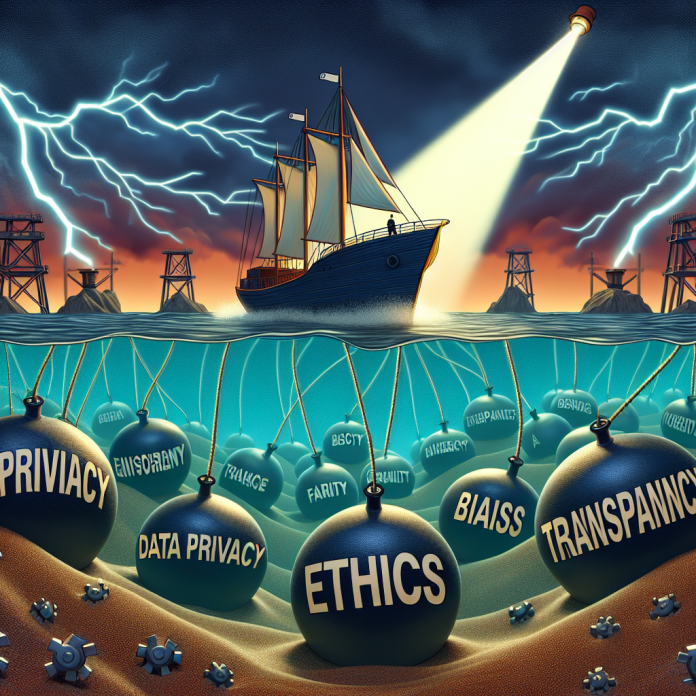Ethical Concerns: Navigating the Complexities of Right and Wrong
In today’s rapidly evolving world, ethical concerns are more prevalent than ever. From privacy breaches to corporate scandals, it seems like every day there’s a new controversy that sparks debate and outrage. But what exactly are ethical concerns, and why do they matter so much?
What Are Ethical Concerns?
Ethical concerns revolve around questions of right and wrong, moral dilemmas, and the principles that guide human behavior. These concerns are rooted in the philosophical idea of ethics, which seeks to understand what actions are considered good or bad, right or wrong, and just or unjust.
One of the key aspects of ethical concerns is the idea of ethical relativism – the notion that what is considered ethical can vary depending on cultural norms, societal values, and personal beliefs. This means that what may be deemed ethical in one society may be considered unethical in another, making navigating ethical dilemmas a complex and nuanced process.
Real-Life Examples of Ethical Concerns
To better understand ethical concerns, let’s look at some real-life examples that have captivated public attention in recent years.
1. Privacy Concerns in the Digital Age
With the rise of technology and social media, privacy concerns have become a major issue. From data breaches to surveillance techniques, individuals are constantly at risk of having their personal information compromised. Companies like Facebook and Google have been under scrutiny for their handling of user data, raising important questions about privacy rights and ethical responsibilities.
2. Corporate Scandals
Corporate scandals, such as the Enron scandal in 2001, shed light on the ethical shortcomings of businesses. Enron executives engaged in fraudulent accounting practices, manipulating financial statements to deceive investors and inflate stock prices. This scandal not only led to the collapse of Enron but also exposed the ethical lapses that can occur when profit is prioritized over integrity.
3. Environmental Concerns
The threat of climate change and environmental degradation has sparked ethical concerns about sustainability and stewardship of the planet. From deforestation to pollution, human activities have a significant impact on the environment, raising questions about our ethical responsibilities to future generations and the natural world.
Navigating Ethical Dilemmas
When faced with ethical dilemmas, it can be challenging to determine the right course of action. However, there are certain principles and frameworks that can help guide decision-making in ethical situations.
1. Utilitarianism
One ethical framework that is commonly used to analyze ethical concerns is utilitarianism. Utilitarianism posits that the right course of action is the one that maximizes happiness and minimizes suffering for the greatest number of people. When applying utilitarian principles to ethical dilemmas, individuals must consider the potential consequences of their actions and weigh the benefits and harms to determine the most ethical choice.
2. Deontological Ethics
Another ethical framework is deontological ethics, which focuses on duty and moral principles. According to deontological ethics, certain actions are inherently right or wrong, regardless of their consequences. This framework emphasizes the importance of following moral rules and fulfilling one’s ethical obligations, even if it may not lead to the best outcomes.
3. Virtue Ethics
Virtue ethics, on the other hand, emphasizes the development of moral character and virtues such as honesty, compassion, and integrity. Proponents of virtue ethics argue that ethical behavior stems from cultivating virtuous traits and acting in accordance with them. This framework focuses on the importance of personal integrity and ethical growth in navigating ethical dilemmas.
The Importance of Ethical Concerns
Ethical concerns play a crucial role in shaping our society, influencing decisions in politics, business, healthcare, and beyond. By addressing ethical dilemmas and grappling with moral questions, individuals and organizations can uphold integrity, foster trust, and promote social responsibility.
In the digital age, where privacy breaches and data misuse are rampant, ethical concerns are more relevant than ever. Companies are under increasing pressure to prioritize customer privacy and data security, recognizing the ethical implications of their actions on individual rights and societal values.
Similarly, in the wake of corporate scandals like the Enron scandal, there has been a renewed focus on ethical leadership and corporate governance. Organizations are recognizing the importance of ethical behavior in building trust with stakeholders, maintaining reputation, and sustaining long-term success.
As we continue to grapple with environmental concerns and the threats of climate change, ethical considerations play a critical role in guiding sustainable practices and promoting environmental stewardship. By acknowledging our ethical responsibilities to the planet and future generations, we can work towards a more sustainable and ethical future.
Conclusion
Ethical concerns are a pervasive and complex aspect of human society, influencing decisions, behaviors, and values. By examining real-life examples, navigating ethical dilemmas, and understanding ethical frameworks, individuals and organizations can navigate the complexities of right and wrong with integrity and accountability.
In a world where ethical lapses and moral dilemmas abound, it is essential to prioritize ethical considerations, uphold ethical principles, and strive towards a more just and ethical society. By embracing ethical concerns and ethical responsibilities, we can shape a world that values integrity, compassion, and ethical leadership.

